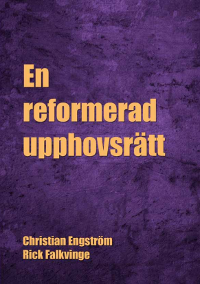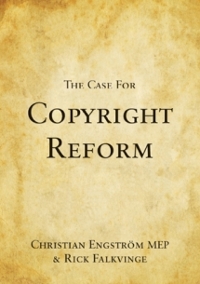Yesterday evening there was a debate in the European Parliament about the ACTA agreement on intellectual property rights enforcement. The EU Commission, which has been negotiating the agreement, was represented by trade commissioner Karel De Gucht, who defended the agreement.
Many of the Members of the European Parliament who spoke in the debate were critical of the agreement, while others seemed to accept the Commissions view that the agreement will change nothing, and that all criticism of the agreement is based on misunderstandings.
I focused on the issue of ”three-strikes”, i.e.: whether Internet Service Providers will be forced to start policing their customers, and cut the internet connection for people who are accused of illegal file sharing.
This is what I said:
On the 10th of March this year, this house adopted with an overwhelming majority a resolution saying, among other things, that the agreement ”should not make it possible for any so-called ”three-strikes” procedures to be imposed.
This is because we don’t want the Internet service providers to start acting as private police forces, or be forced to take on that role. The Commission has repeatedly said in various oral statements that this is not the case, and I welcome those statements.
However, when you look at the text, it starts already in the preamble: ”Desiring to promote cooperation between service providers and rights holders with respect to relevant infringements in the digital environment”. Then, in Article 2.18.3, as Ms. Schaake was quoting: ”shall endeavor to promote cooperative efforts within the business community to effectively address copyright infringements”.
Now, if this doesn’t mean ”three-strikes”, what does it mean? It’s all very well to talk about ”cooperation” between rights holders and ISPs, but what are the ISPs supposed to do? And if the don’t want to do it, what measures will be taken against the ISPs?
I’m very, very concerned that the language in this agreement, as Ms. Castex was saying, is so ambiguous that it isn’t really clear what it means. So the basic concerns that have been with us all along, I still have them.
I would very much want to see a proper evaluation of the fundamental rights aspects of this agreement.
In commissioner De Gucht’s response he reiterated his claim that ACTA does not demand three-strikes, but he failed to give any explanation of what the paragraphs about ”cooperation” are supposed to mean if it is not three-strikes, or why those paragraphs are present in the agreement in the first place.
On the issue of an impact study on fundamental rights (which I was not the only one to ask for) he dismissed it by referring to himself: ”I have made several statements in this plenary that there is no impact whatsoever on fundamental rights in any way”. In the commissioner’s view, that apparently is sufficient reason not to conduct any such study before the agreement.
I was not very impressed by the commissioner’s statement. In my opinion, there are far to many aspects of this agreement that still need to clarified before the European Parliament should even consider giving its consent.
If the best argument the Commission can give for this controversial agreement is that it ”changes nothing”, that is hardly good enough even if it were to be true.
…………
Web streams and transcripts of the debate can be found at http://www.europarl.europa.eu/sed/speeches.do?sessionDate=20101020.
The blog På djupa vatten has a good summary in Swedish of the debate.
Picture by Christian Engström, free for publication CC0
Tags: piratpartiet, eu, politik, informationspolitik

 Christian Engström, former Member of the European Parliament 2009-2014 for Piratpartiet, Sweden
Christian Engström, former Member of the European Parliament 2009-2014 for Piratpartiet, Sweden




[…] This post was mentioned on Twitter by Piratpartiet Live! and lillebrorsan, TwelvE. TwelvE said: Christian Engström: Debate on three-strikes in ACTA: Trade commissoner De Gucht attended a debate on ACTA in the E… http://bit.ly/a9R6VR […]
Pingback av Tweets that mention Debate on three-strikes in ACTA « Christian Engström, Pirate MEP -- Topsy.com — 21 oktober 2010 @ 12:37
If the Commissions view is right, that the ACTA-agreement will change nothing, why we then need an ACTA-agreement, at all?
Kommentar av Dennis Nilsson — 21 oktober 2010 @ 12:58
The commissioner obviously wants to use the ”Trust me” argument. However, commissioners can be replaced in less than five years from now – but the agreement will live forever.
What’s bothering me is that apparently this ACTA council may take upon itself to ”interpret” the text of the agreement as to mean that there is in fact a demand of a three-strikes procedure. In any case, the ACTA council should be abolished. That council will act as a preserving force for the agreement, and will of course never reach the conclusion that ACTA is not needed.
Instead, if it is necessary, the parties can meet in usual negotiations. There need not be an ACTA council. That will only move power from the legitimate decision making bodies of EU and the member states.
Kommentar av Johan Tjäder — 21 oktober 2010 @ 13:24
The ACTA-agreement will change swedish law, apparantly:
http://www.dn.se/nyheter/politik/acta-avtalet-kraver-ny-svensk-lagstiftning-1.1193058
Kommentar av Sam — 21 oktober 2010 @ 13:55
The supposed changes necessary in swedish law are interesting. Wasn’t it stated that ACTA wouldn’t create new or change existing legislation neither on a EU level nor national level? I thought De Gucht said something like ACTA isn’t a legislative agreement but instead focuses on how to enforce existing legislation. I don’t like it when people are trying to fool me, whether it’s my neighbour, brother, or the commission.
Kommentar av Fredrik — 21 oktober 2010 @ 15:42
But isn’t the agreement supposed to be a ”changing” agreement. That is, it sets up a whole organization to overwatch it, update it and so on. Thus the agreement can change in the future. How is that handled, does one automatically also agree to such changes? If not, what is the purpose of that organization?
Kommentar av Sambor — 21 oktober 2010 @ 16:05
I get the feeling that, for each point where the negotiating parties disagreed, they ”resolved” the disagreement by making the language vaguer until each party could interpret it to mean the same as what they originally wanted to write. Thus each party could feel like they had had it their way, but what new legislation will come out of it depends mostly on who gets to do the interpretation.
Kommentar av Björn Persson — 21 oktober 2010 @ 20:57
Is the US going to get a free pass in ACTA?
In the Plenary debate on ACTA on October 20, 2010, the Commission repeated ”ACTA will not change the EU acquis”[1]. One day later, the Swedish minister of Justice said ACTA will require changes in Swedish law [2], increasing the powers of the police to act on its own initiative to enforce intellectual property rights.
So how can this be true? First you say no changes in EU law, then law in Europe changes??? Well, the EU acquis is not the same as Swedish law, EU directives must be passed by the Swedish Parliament. So the Commission gets away with the ”don’t worry”-promises over here in Europe.
In the US there is now suddenly a similar situation. It looks like US Patent and Trademark Office will confirm the worries by Senators Sanders and Brown [3] that ACTA will require changes in US law (just like the minister in Sweden). Yet the US Trade Representative has promised (just like the Commission) that ACTA will not, and cannot, change US law, because USTR is negotiating ACTA under an Executive Agreement.
So how does USTR plan to get away with ”don’t worry”-promises over there in the USA?
Guess what? USTR argues that ACTA will not be *binding* on the US!!! Check out this article: ”USTR’s implausible claim that ACTA Article 1.2 is an all purpose loophole, and the ramifications if true” [4].
This is really worrying. Is the EU caving in to the double standards of the US? And is Commissioner De Gucht about to agree with a deal where one party gets off the hook? Is the US going to get a free pass in ACTA while the rest of the world, including EU tax payers, pay the price? Nice try!
The Commission has not yet initialled ACTA so it is not too late to return to the negotiating table to sort out this mess.
Call on your government representatives and tell them that your country is not for sale!!! If anything, all rules of ACTA should apply equally to all parties. Say No to a US free pass in ACTA!
[1] Debates, Wednesday, 20 October 2010 – Strasbourg, point 16. Anti-Counterfeiting Trade Agreement (ACTA): http://www.europarl.europa.eu/sides/getDoc.do?pubRef=-//EP//TEXT+CRE+20101020+ITEM-016+DOC+XML+V0//EN&language=EN
[2] Dagens Nyheter, ”Acta-avtalet kräver ny svensk lagstiftning”: http://www.dn.se/nyheter/politik/acta-avtalet-kraver-ny-svensk-lagstiftning-1.1193058
[3] http://keionline.org/sites/default/files/senator_sanders_brown_kappos_19oct2010.pdf
[4] http://keionline.org/node/990
Kommentar av Erik Josefsson — 23 oktober 2010 @ 3:03
Oh, i like that claim
/irony.
First the US starts debating ACTA behind closed doors. Invited attendees are RIAA, MPAA and other large-business stakeholders. But apparently no one else such as the telecommunications services, or for that matter, public representatives. Then they start discussin ACTA overseas. ACTA leaks and furor ensues.
And now that the US congress and senate have been made aware of what ACTA actually is, they start looking at how it would affect the US and decide that just isn’t acceptable.
So the originators of ACTA have taken a closer look at what will have to be changed in local law and decided to opt out – while at the same time continuing to push for a rock solid implementation overseas. The hypocrisy is blinding…
Kommentar av Scary Devil Monastery — 25 oktober 2010 @ 10:13